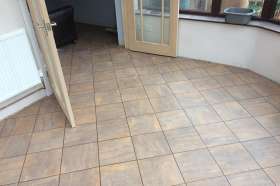
A History of Vinyl Tiles
Posted on: 28th September 2017Whatever the floor space, vinyl is a durable and versatile option. Whether it’s for a large commercial application or for a domestic installation, such as a kitchen or bathroom, vinyl provides a practical and stylish solution. With modern Luxury Vinyl Tiles, you can have flooring that imitates natural materials without losing the practical benefits that have made vinyl one of the most popular flooring methods of the last century. But what exactly is vinyl, and how has it changed since it was first developed?
Vinyl Revolution

It was in 1926 that an inventor from the US, Waldo Semon, patented a new product called polyvinyl chloride. This was a synthetic material made from carbon, hydrogen and chlorine. Seven years later the new man-made product was properly launched into public consciousness at the Century of Progress Exposition in Chicago. The scarcity of materials during the Second World War meant vinyl took a back seat for a while in the ‘30s and ‘40s, but PVC (as it is commonly known to us now) has since gone on to become the world's third-most widely produced synthetic plastic polymer. From bottles, to fashion items, to flooring, it would be hard to imagine what modern life would look like without PVC.
Changing Rooms
Although similar, vinyl and linoleum are not the same material. If lino was known as the flooring of choice for the 1950s, it was the 1960s that became synonymous with vinyl. Vinyl flooring was increasingly becoming known as a hygienic, durable and comfortable product. It was not until the 1980s that vinyl’s popularity waned due to concerns that it contained asbestos. Thankfully, this is no longer the case, but if you believe you may have vinyl asbestos tiles in your home: please consult a professional before attempting to take them up. Asbestos tiles do not always pose a risk, but it is definitely better to be safe than sorry.
Vinyl Revival

It’s not surprising that once the concerns about asbestos had been recognised and the substance removed from the manufacturing process of vinyl, the flooring material began to make a comeback. As well as continuing to offer the same comfort and resilience as older vinyl, modern brands offer increasing aesthetic variety. Able to mimic almost any natural stone or wood flooring, Luxury Vinyl Tiles (LVTs), offer customers the best of both worlds. As vinyl flooring can easily be recycled, it also makes for a highly environmentally-friendly option.
For further information about vinyl flooring, call us on 01603 879359. Alternatively, come and visit us in our extensive flooring showroom at Shepherds Business Park, Lenwade. Our team of sales people will be able to answer all of your questions on the sustainability of our products.
Follow us on Facebook for regular articles on our high-quality product ranges.




